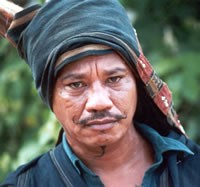Selaru in Indonesia

Photo Source:
Franc Le Blanc
|
Send Joshua Project a map of this people group.
|
| People Name: | Selaru |
| Country: | Indonesia |
| 10/40 Window: | Yes |
| Population: | 19,000 |
| World Population: | 19,000 |
| Primary Language: | Selaru |
| Primary Religion: | Christianity |
| Christian Adherents: | 90.00 % |
| Evangelicals: | 5.00 % |
| Scripture: | Portions |
| Ministry Resources: | Yes |
| Jesus Film: | Yes |
| Audio Recordings: | Yes |
| People Cluster: | Maluku-Southern |
| Affinity Bloc: | Malay Peoples |
| Progress Level: |
|
Introduction / History
The Selaru are the indigenous people of Selaru Island (and a few neighbouring islets) in the Tanimbar archipelago of Maluku Province, eastern Indonesia. Their language, Selaru, is an Austronesian (Central–Eastern Malayo-Polynesian) language of the South Tanimbar group and has been the subject of descriptive work by field linguists. Mission contacts and colonial-era administration brought wider Indonesian influences on the islands over the 20th century, while Selaru society has retained many island-based institutions and customary relationships.
What Are Their Lives Like?
Selaru people traditionally live in small coastal villages where fishing, reef and near-shore gathering, sago and root-crop cultivation, and small garden plots form the core of subsistence. Village social life is organised around kinship, village-house systems and island institutions that regulate exchange and ritual; craft skills such as ikat weaving and wooden carving are important cultural expressions. Increasing schooling, church presence and contact with the wider Indonesian economy have created more movement of young people to regional towns, but many families continue seasonal fishing and garden cycles on Selaru.
What Are Their Beliefs?
Christianity (both Protestant and Roman Catholic) is the dominant religious influence across the Tanimbar Islands and among Selaru people, with churches playing central roles in worship, education and community life. At the local level Christian faith is often shaped by older customary beliefs and village ritual: ancestral respect, village solidarity and island ceremonial forms remain woven into lived religion. Local congregations and mission activity have produced Christian resources and services in the area.
What Are Their Needs?
The Selaru people need access to Scripture and discipleship materials presented in Selaru or in culturally appropriate formats, so that believers can hear and apply the gospel in their own language and idioms. The Selaru people need training and equipping for indigenous church leadership—pastors, elders and lay-teachers from Selaru villages—so local churches can be self-sustaining and culturally grounded.
The Selaru people need support for the preservation and teaching of Selaru language and cultural arts (for example ikat weaving and oral histories) so that language shift to Bahasa Indonesia does not erase their distinct identity. The Selaru people need holistic development assistance—improved access to education, health services and livelihood support that fit reef-island ecosystems—so that spiritual growth is accompanied by improved physical and economic wellbeing.
Prayer Points
Pray that Selaru believers would receive God's word in language and forms they understand, and that Scripture would take root in homes and village life.
Pray for the raising up and training of indigenous Selaru church leaders who combine biblical faithfulness with cultural wisdom.
Pray that Selaru youth will retain their language and cultural arts while following Christ, so that faith and identity strengthen one another.
Pray for holistic gospel ministry on Selaru: that churches and partners would serve both spiritual needs and practical needs (health, education, sustainable livelihoods) in ways that honor the best of their culture.
Pray for Selaru Christians to faithfully preach the gospel and make disciples among their people and world around them.
Pray for more discipleship and outreach materials in the Selaru heart language and it's wide distribution.